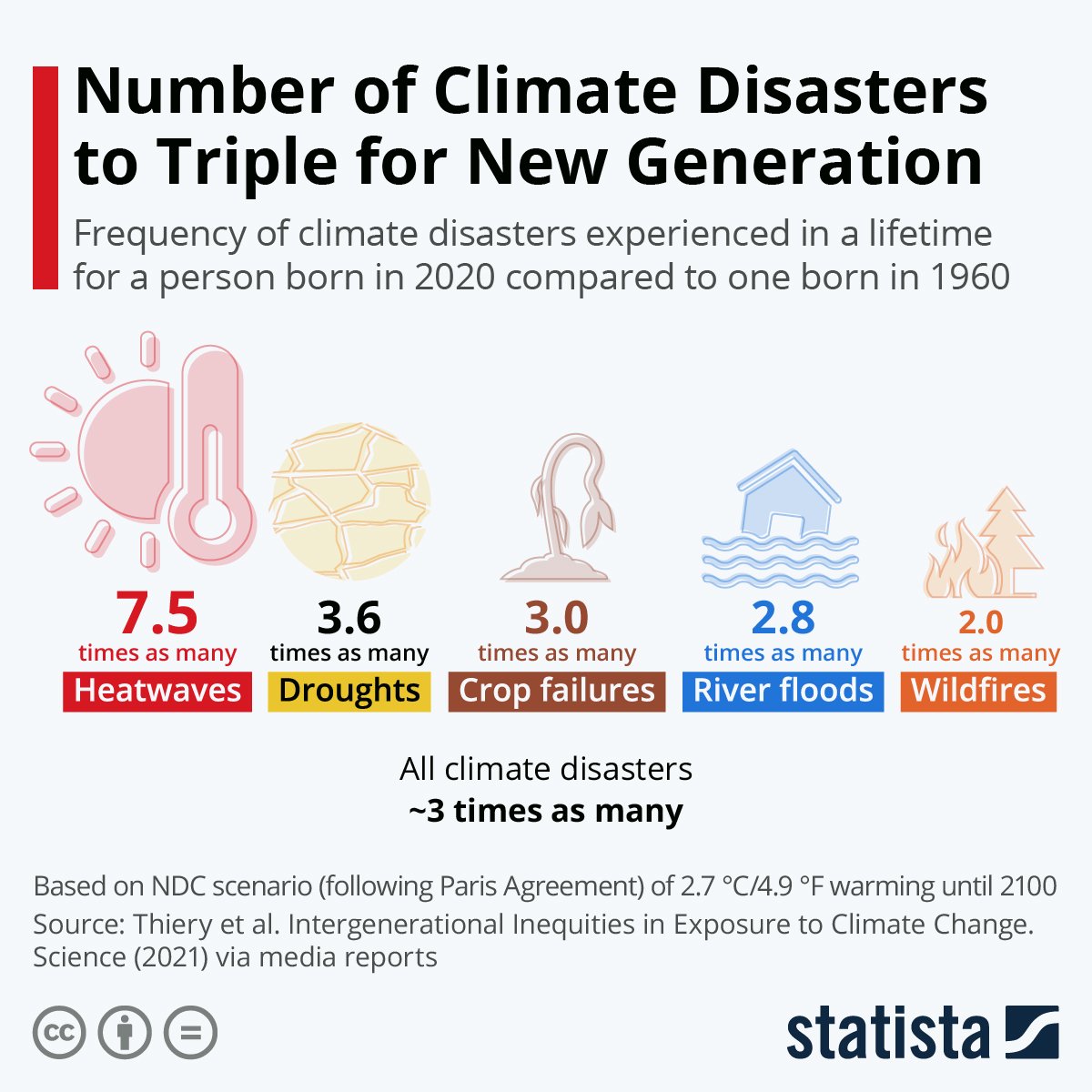Rising storms: navigating the escalating impact of natural disasters on future generations


· 4 min read

In the midst of our technological triumphs and global interconnectedness, a looming threat casts a shadow over the horizon: the escalating impact of climate change on natural disasters. Recent research, painting a stark picture of our changing climate, reveals that children born last year may face three times the number of adverse climate events in their lifetimes compared to earlier generations. This foreboding scenario, based on a projected atmospheric warming of 2.7 degrees until 2100, paints a challenging future marked by more frequent and intense heatwaves, droughts, and extreme weather events.
The World Meteorological Organization's comprehensive review of mortality and economic losses from weather, water, and climate extremes over the past 50 years provides invaluable insights. The report underscores the increasing frequency and severity of disasters, driven by climate change, improved reporting, and more extreme weather events.
Beyond the environmental repercussions, the economic toll of extreme weather events is staggering. A recent study estimates that the damage caused by extreme weather events has cost $16 million (£13 million) per hour for the past two decades. From 2000 to 2019, the average annual costs reached $140 billion (£115 billion), reflecting the devastating impact on lives and property. The latest data for 2022 indicates a doubling of costs to $280 billion, emphasizing the urgency of addressing this escalating crisis.
Two-thirds of these costs are attributed to the lives lost, a poignant reminder that the impact of these disasters goes far beyond financial considerations. Storms, floods, heatwaves, and droughts have claimed many lives and destroyed vast swaths of property in recent decades, with global heating making these events more frequent and intense.
The ramifications of climate change extend beyond economic losses. Ecosystem disruptions, loss of biodiversity, threats to food and water availability, and potential conflicts are looming challenges. Coastal populations face displacement, exacerbating existing social and economic inequalities. The burden of addressing these challenges falls heavily on future generations, who will bear the consequences of the actions taken today.
In the face of this escalating crisis, nations and communities must adopt a multi-faceted approach to mitigate the impact of natural disasters on future generations. There is a need to review evolving hazard exposure and vulnerability, considering a changing climate. This includes recognizing that tropical cyclones may follow different tracks, intensities, and speeds than in the past.
One of the silver linings amid the storm of escalating climate-related disasters is the improvement in early warning systems. The study acknowledges that improved multi-hazard early warning systems have contributed to a significant reduction in mortality. However, it emphasizes that only half of the 193 members of the World Meteorological Organization (WMO) have such systems in place, pointing to the need for greater global collaboration to ensure that all countries, particularly vulnerable ones, have access to effective early warning mechanisms.
As extreme weather events become more frequent and intense, investing in resilient infrastructure becomes paramount. Countries need to prepare for rising sea levels, higher wind speeds, and other hazards associated with climate change. Updating zoning laws and building codes to account for these changes, coupled with the implementation of sustainable urban planning practices, can significantly reduce the impact of disasters on both lives and property.
Strengthening disaster risk financing mechanisms at national and international levels, especially for vulnerable countries, is crucial for effective disaster response and recovery. However, addressing the growing impact of natural disasters requires global collaboration. The loss and damage fund established at the UN's climate summit in 2022 is a step in the right direction, but the study suggests that the methodology used to estimate climate costs could play a crucial role in determining the funding needed for such initiatives. Rapid attribution studies on extreme weather events could expedite the delivery of funds, acting as a form of insurance for affected countries.
Policies and strategies for disaster risk management must be integrated with climate change adaptation efforts. This includes developing proactive policies for slow-onset disasters like droughts, considering the changing climate landscape. Comprehensive disaster risk management should be a priority, ensuring that climate change adaptation is embedded in national and local strategies.
As natural disasters become more frequent and intense, the world stands at a crossroads. The evidence presented in recent studies demands immediate and collective action. Strengthening early warning systems, investing in resilient infrastructure, fostering global collaboration, and integrating climate change adaptation into disaster risk management are crucial steps. Learning from the lessons of the past 50 years, we have the opportunity to shape a more resilient and sustainable future for generations to come. The time to act is now, and the stakes could not be higher. In the face of rising storms, we must navigate a path toward a safer and more secure tomorrow.
Future Thought Leaders is a democratic space presenting the thoughts and opinions of rising Sustainability & Energy writers, their opinions do not necessarily represent those of illuminem.
illuminem briefings

Corporate Governance · Adaptation
illuminem briefings

Sustainable Finance · ESG
illuminem

Adaptation · Biodiversity
Politico

Climate Change · Agriculture
CBC News

Climate Change · Biodiversity
Human Rights Watch

Adaptation · Environmental Rights